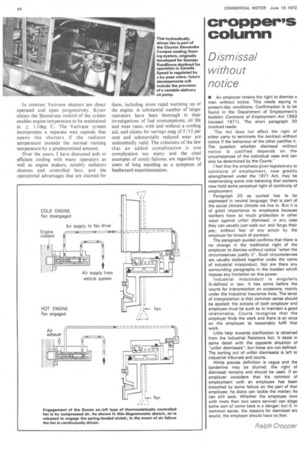cropper's column
Page 46

If you've noticed an error in this article please click here to report it so we can fix it.
D ism issal without notice
• An employer retains the right to dismiss a man without notice. This needs saying in present-day conditions. Confirmation is to be found in the Department of Employment's booklet: Contracts of Employment Act 1963 (revised 1971). The short paragraph 20 involved reads: "The Act does not affect the right of either party to terminate the contract without notice if the behaviour of the other justifies it. The question whether dismissal without notice is justified depends on the circumstances of the individual case and can only be determined by the Courts."
I feel that the emphasis given legislatively to contracts of employment, now greatly strengthened under the 1971 Act, may be mesmerizing some into believing that workers now hold some perpetual right of continuity of employment.
Paragraph 20 as quoted has to be expressed in neutral language; that is part of the social climate climate we live in. But it is of great importance to employers because workers have so much protection in other ways against unfair dismissal; in any case they can usually just walk out and forgo their pay, without fear of any action by the employer for breach of contract.
The paragraph quoted confirms that there is no change in the traditional right of the employer to dismiss without notice "when the circumstances justify it". Such circumstances are usually dubbed together under the name of industrial misconduct. Nor are there any surrounding paragraphs in the booklet which impose any limitation on this power.
Industrial misconduct is singularly ill-defined in law. It has come before the courts for interpretation on occasions, mainly under the Industrial Insurance Acts. The tenor of interpretation is that common sense should be applied; the actions of both employer and employee must be such as to maintain a good relationship. Courts recognize that the employer finds the work and there is an onus on the employee to reasonably fulfil that work.
Little help towards clarification is obtained from the Industrial Relations Act. It deals in some detail with the opposite situation of "unfair dismissals"; but these are not defined. The sorting out of unfair dismissals is left to industrial tribunals and courts.
While precise definition is vague and the borderline may be blurred, the right of dismissal remains and should be used. If an employer considers that his contract al employment with an employee has been breached by some failure on the part of that employee, he alone can tackle the matter; he can still sack. Whether the employee (one with more than two years service) can stage some sort of come back is a danger; but if, in common sense, the reasons for dismissal are sound, the employer should have no fear.
Ralph Cropper




























































































